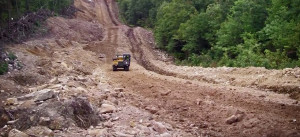Last Saturday, Lovettsville residents and citizens from across Virginia and other states as far away as Georgia, traveled to the Bears’ Den on the Appalachian trail on the Loudoun County side of Mount Weather, to share the view that fracked gas pipelines must be stopped and the scenic trail saved from “desecration.”
The folks who came were young and old, some ordinarily political partisans, but they came together, despite their differences, resolved to stop these pipelines.
If there could be any doubt about what they “really” thought, they posed with a mock 1-foot diameter pipeline segment, “inscribed,” “NO FRACKING PIPELINE.”
It was only a hint of the EQT and Nextra’s proposed 300-mile $3.2-Billion Mountain Valley Pipeline (MVP), a pipe almost four feet in diameter, carrying dangerous odorless fracked gas from West Virginia that threatens the trail and the environment.
There were testaments from the speakers, objecting to taking the land by eminent domain, and complaints about the proposed pipe’s adverse effects including air pollution, soil erosion, groundwater contamination, terrible noise levels, lowered property values, and possible onsite accidents including gas explosions like has already occurred in Appomattox, Virginia.
If the pipeline is sited as presently proposed, speakers charged, it shall destroy once and forever the natural view shed along 100 miles of the 2,200-mile scenic Appalachian Trail, including Angels Rest, Kelly Knob, Rice Fields and Dragons Tooth — among the most visited and photographed locations on the entire trail that extends from Georgia to Maine. Continue reading



